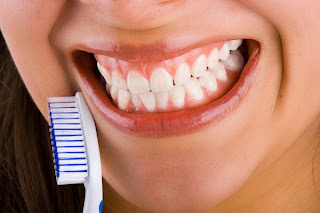Gingivitis ("inflammation of the gum
tissue”) is a non-destructive periodontal
disease. The most common form of gingivitis, and the most
common form of periodontal disease overall, is in response to bacterial biofilms (also called plaque) adherent to tooth surfaces, termed plaque-induced gingivitis. In the absence of treatment, gingivitis
may progress to periodontitis, which is a destructive form of periodontal disease. So if you’ve ever asked the question, “Do I
have gingivitis?” here’s how to tell:
What Is
Gingivitis?
Gingivitis is an infection of gum tissues caused by bacteria
present in the saliva and tissues of the mouth. This disease is more prevalent
in the presence of plaque or tartar buildup on teeth. Gingivitis can be
painless and even harmless in the very early stages, but can grow steadily more
dangerous over time.
Sign and Symptoms
Normal gums should be firm and pinkish, and
should not bleed when you brush your teeth normally. Gingivitis primarily
affects the gums. Signs and symptoms include:
·
Painful or tender gums
·
Swelling in the gums
·
Soft gums
·
Gums become dusky red instead of
healthy pink
·
Gums bleed after brushing or
flossing teeth
Dangers
of Gingivitis
In the early stages, gingivitis is easily reversed with proper
brushing and flossing of the teeth. But as gingivitis progresses it can lead to
periodontitis, in which the bacteria that began by infecting the gums cause gum
tissue to pull back from the teeth, exposing the periodontal bone. Bacteria
then have access to affect bone directly, causing pitting and shrinking of the
bone and an eventual loosening of the teeth.
Treatment
and Prevention of Gingivitis
To effectively treat gingivitis, you have to remove
the source of the infection. By brushing teeth regularly, plaque buildup can be
kept to a minimum. Flossing is very important when it comes to gingivitis
treatment and prevention. Flossing helps remove plaque in between teeth that
are hard to reach with a toothbrush. Regular checkups with your dentist are also important. Here at Krengel Dental in West
Bloomington, we can remove plaque that is too dense to be removed by a
toothbrush or floss.

Gum disease can be terrible. A gradual weakening of our gums can lead to tooth loss; forcing us to alter our diet and meaning that we lose our award winning smile. It is therefore vitally important that treatment for gum disease is sought as soon as it is identified. The more advanced the condition, the more likely that surgical treatments will be necessary. Thanks.
ReplyDeleteemergency dentist bensonhurst brooklyn